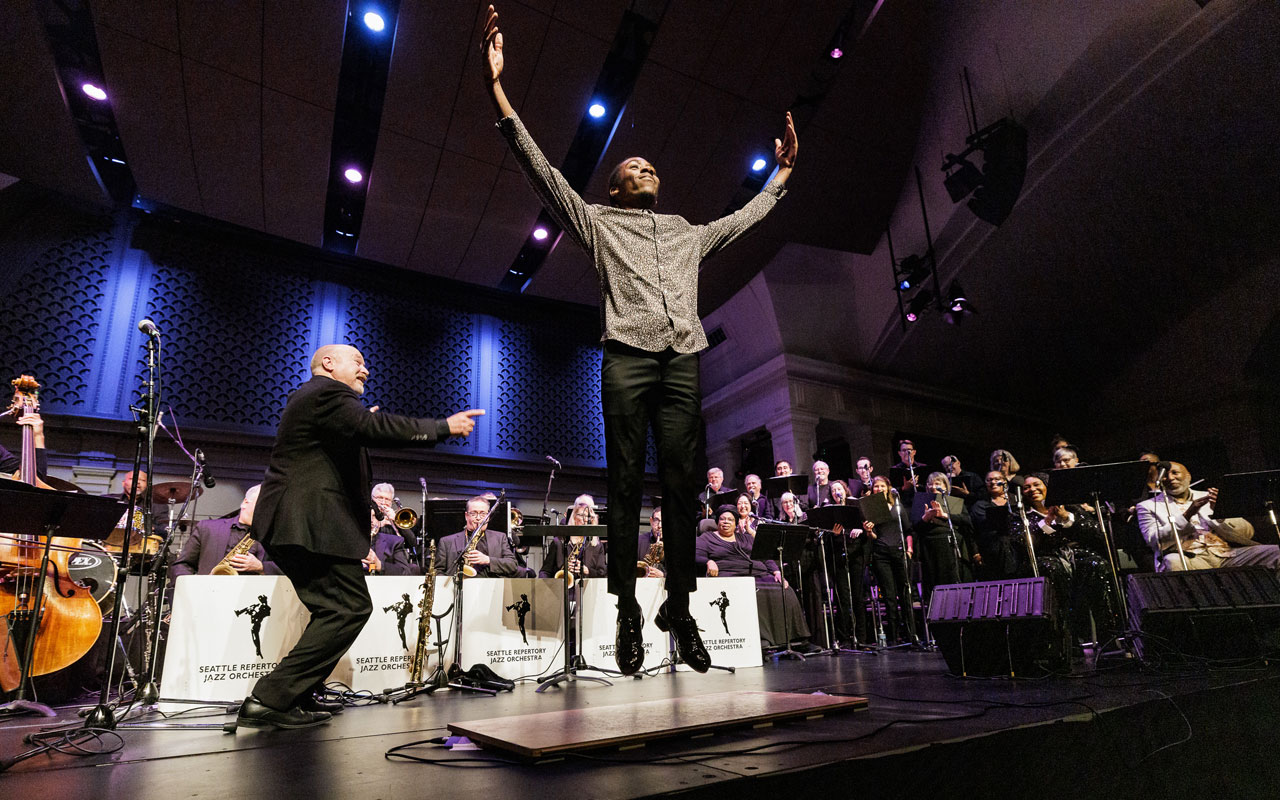
Cipher Goings performing with SRJO at the 2022 Sacred Ellington concert. Photo by Jim Levitt.
Saturday, December 30, 7:30pm
Town Hall Great Hall
1119 8th Ave
$12-65
Earshot Jazz and the Seattle Repertory Jazz Orchestra (SRJO) come together this December for the 35th installment of their beloved Sacred Music Concert series. Join the SRJO, featuring a 17-piece big band (led by Artistic Director Michael Brockman) alongside vocal soloists Robert Neal and Nichol Eskridge, tap dancer Cipher Goings, gospel choir The Sound of the Northwest (directed by Vanessa Bruce), and the chamber choir Northwest Chamber Chorus (directed by Jeremy Edelstein), in-person or via livestream for their performance of an amalgamation of Ellington’s three Sacred Concerts.
The first Concert’s history is imposing: Ellington was approached in 1962 by a representative of San Francisco’s Grace Cathedral “to compose and play a concert of sacred music,” a suggestion which both astonished and enamored the sixty-six-year-old Ellington. (His initial response: “What did you say?”) He began the undertaking amid intense personal strife—both his former wife, Edna, and his long-time collaborator, Billy Strayhorn, were gravely ill.
The setting could have been no less austere. Grace Cathedral—a massive Gothic structure of French architectural influence located on Nob Hill—completed its reconstruction in 1964 as the third-largest Episcopalian cathedral in the United States. To celebrate and consecrate its opening, the Cathedral—led by Dean C. Julian Bartlett, a New Orleans native and jazz aficionado—held a year-long Festival of Grace. The festival’s 1965 roster included a sermon by Rev. Martin Luther King Jr., a performance of Billy Budd, and a “jazz mass” by pianist Vince Guaraldi.
Despite historical conflicts between sacred and secular, gospel vs. “devil’s music,” the Black church against the nightclub, the intense spirituality of blues and jazz has never been far from hand. The 1960s witnessed a formalized reconciliation between these two poles—seen in work by John Coltrane, Mary Lou Williams, and Father Norman O’Connor. Finally, in September of 1965, was Ellington’s Concert.
Ellington stepped into this moment with his Concert of Sacred Music, an intimate-if-sumptuous reflection on his Baptist upbringing, the political struggle and powerful longing of the Civil Rights Era for racial justice, and a declaration of universal spiritual values—particularly, freedom and humility. Ellington bares himself in this work, a loud public confession of “what I have been saying to myself on my knees.” Brockman notes: “Ellington was always trying to mix spirituality and jazz at a time when jazz was not welcome in most churches.” The work maintains, however, an ecumenical vision through the idiom of jazz. Per Ellington: “Every man prays in his own language, and there is no language that God does not understand.”
The history of the concert itself is no less magnificent than that of its Seattle series—the longest-running presentation of this demanding work in the world—rarely played due to the Concert’s sheer scale and size. The series began in 1989 with a pickup ensemble of Seattle jazz greats—such as Marc Seales, Floyd Standifer, Don Lanphere, Julian Priester, Jay Clayton, Michael Brockman, and Clarence Acox Jr.—organized by Lara Morrison with support from the Interfaith Council of Seattle. Brockman and Acox would go on to form SRJO shortly thereafter—born, as it were, in Ellington’s wake. The yearly concert has served to “nurture careers and as encouragement for Seattle musicians,” says Brockman.
All are welcome to attend this cherished Seattle jazz tradition. Tickets at earshot.org.